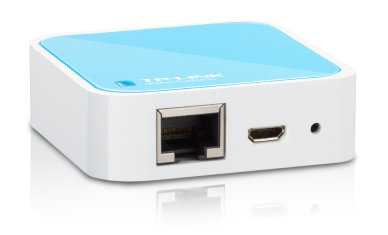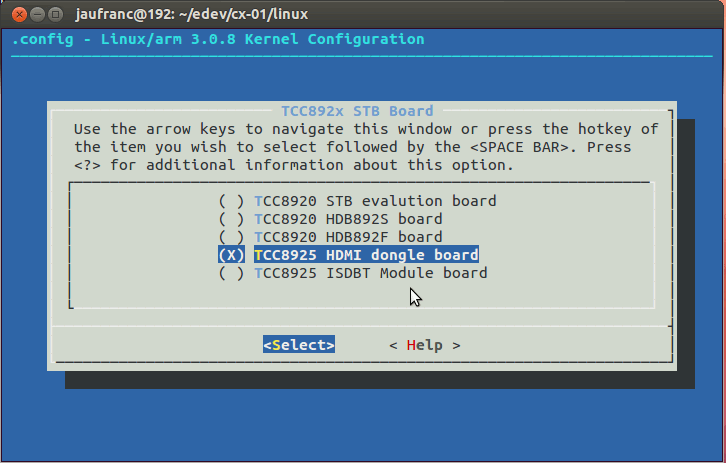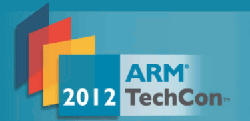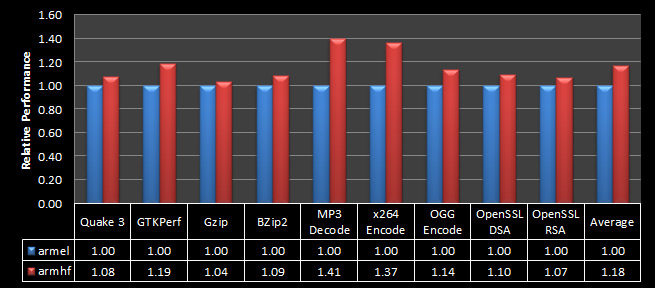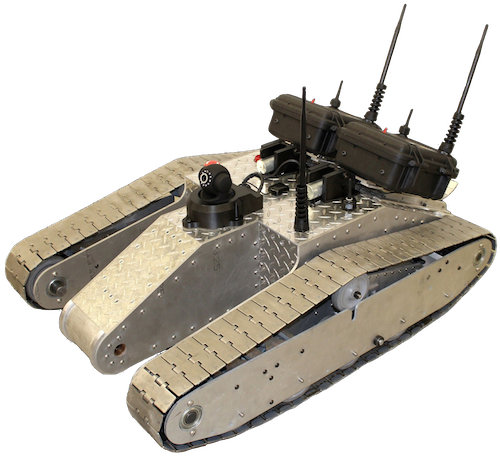TP-Link WR703N is a tiny 802.11N 150 Mbps Wi-Fi router smaller than a credit card (5.7 x 5.7 cm) and 1.8 cm thick based on Atheros AR7240 processor with 4 MB flash and 32 MB RAM. It costs just above $20 US and can be hacked with openWRT. It features one USB host connector that allows you to connect USB devices (USB flash drive, printer…) to it. TL-WR703N Specifications: Atheros AR7240 CPU @ 400Mhz (MIPS24k core) Atheros AR9331 Chipset (integrated wireless) 10/100 Mbit Ethernet port 802.11 b/g/n 150Mbps 3G support via external USB dongle 4 MB flash memory 32 MB RAM USB 2.0 port micro-USB port for power Dimension – 5.7 x 5.7 x 1.8 cm All you need is a USB to TLL board to access the serial console, open the box to access the serial pins (TP_IN and TP_OUT) and follow the instructions on openWRT website to convert […]
Building the Linux Kernel 3.0.8 For Telechips TCC8925 mini PCs (CX-01, Z900, TizzBird N1…)
Yesterday, we got Linux kernel 3.0.8 source code from Telechips, as well as some files related to Android 4.0 (Webkit + OMX). Today, I’ve had a look at the kernel source code and found a few very interesting things. First let’s get the code from github:
|
1 |
git clone git://github.com/cnxsoft/telechips-linux.git |
Good news! The code for the latest Telechips TCC892X is present in arch/arm/mach-tcc892x, and there is support for 3 types of boards: board-m805_892x – TCC8923 M805 board board-tcc8920 – TCC8920 evaluation board board-tcc8920st – TCC8920 STB evaluation board TCC8920 STB evaluation board appears to be relevant to products such as Diyomate A6, but if it’s also used for TCC8925 HDMI Dongle such as CX-01 mini PC, Zero Devices Z900 or ValuePlus TizzBird N1. Now let’s have a look at the default config directory for arm (arch/arm/configs):
|
1 2 3 4 5 6 7 8 |
ls | grep tcc89 tcc8920st_defconfig tcc8920st_hdb892s_defconfig tcc8925st_dongle_defconfig tcc8925st_donglehs_defconfig tcc8925st_hdb892f_defconfig tcc8925st_isdbt_module_defconfig tcc892x_defconfig |
Nice! tcc8925st_dongle_defconfig and tcc8925st_donglehs_defconfig look particularly interesting! A quick comparison shows that the only difference is […]
ARM TechCon 2012: Software & System Design Schedule
ARM Technology Conference (TechCon) 2012 will take place on October 30 – November 1, 2011, in Santa Clara, and UBM Electronics has already posted the detailed schedule for the event. The first day (October 30) will be Chip Designs day and the other 2 days will focus on Software & System Design. Even if, like me, you are not be able to go there, it’s still interesting to know what will be discussed at the conference, to have a better idea where ARM is going, and what new technologies and/or development techniques are (or will become) available. There will be around 70 sessions categorized in 15 tracks: Android / Open Source – Development tools, middleware for native application development, and optimized drivers for Android, Linux, FreeRTOS etc … Compute Platforms – Development and implementation of standards and specifications, from board/module design to consumer and server designs Developing / Debugging – […]
Raspberry Pi Releases Raspbian SD Card Image Based on Debian Wheezy ARMHF
The Raspberry Pi foundation announced the very first stable release of the Raspbian distribution, which is based on Debian 7.0 “Wheezy” armhf rootfs in order to take advantage of the FPU in Broadcom BCM2835. This distribution offers up to 40% performance improvement on several tasks, and for some specific tasks such as MP3 encoding is can boost the speed by nearly 6 times thanks to hard-float support. It is now the recommended distribution for the Raspberry Pi, runs LXDE environment, and comes with Midori browser, development tools and example source as per the previous Debian distros. omxplayer by gimli (XBMC developer) is also pre-installed in the image, and will allow you to play videos using hardware acceleration. You can download Raspbian via: Bittorrent – 2012-07-15-wheezy-raspbian.zip.torrent HTTP – 2012-07-15-wheezy-raspbian.zip The default credentials are pi / raspberry. Adam Armstrong has run some benchmarks to compare Raspbian (armhf) with the previous Raspberry Pi […]
Telechips Releases Linux Kernel 3.0.8 and Android ICS Source Code
Telechips has just uploaded the GPL source code for kernel 3.0.8 and Android 4.0 to the open source section of their website. If downloading from telechips website is too slow, you can also try alternate downloads (Thanks Gabe!): Kernel-3.0.8.tar.gz Ics.tar.gz I’ve also created 2 repositories in github: telechips-linux – Linux kernel source code telechips-android – Android platform open source code (webkit + OpenMAX source code) It haven’t looked into the source code in details yet, but hopefully, this will allow developers to customize the firmware running on Telechips TCC8925 based mini PCs such as CX-01 mini Android TV Box or Zero Devices Z900. Jean-Luc Aufranc (CNXSoft)Jean-Luc started CNX Software in 2010 as a part-time endeavor, before quitting his job as a software engineering manager, and starting to write daily news, and reviews full time later in 2011. www.cnx-software.com
Emdebian Grip 2.0: Debian For Embedded Systems
I’ve used Emdebian ARM toolchain for several things such as building Raspberry Pi kernel, or cross-compiling VMWare-View, but I must have not paid attention enough, as I only discovered that Emdebian also offered a lightweight Linux distribution for embedded systems called Debian Grip. There was also another distribution called Debian Crush, a customized Emdebian installation without perl, but development stopped after Debian 5.0. Debian Grip is binary compatible with Debian and supports i386, amd64, powerpc, armel, armhf, mips and mipsel. Ports for powerpcspe and sh4 are available for Emdebian unstable. The current stable version Debian Grip 2.0 is based on Debian 6.0 “Squeeze”. You can install Emdebian grip using CD /DVD ISO images or with multistrap (preferred method). Visit the Installation instructions page for details. Here’s how the installation sizes compare between Emdebian Grip (unstable) and Debian (unstable): A basic multistrap of Emdebian Grip (sid-grip) comes out at 56MB installed, […]
ELLCC Multi-Target Cross Compiler Based on Clang and LLVM Compiler Infrastructure
ELLCC is a project aiming at creating a multi-target cross compilation environment for embedded systems. which makes use of Clang and the LLVM compiler infrastructure. QEMU is used for cross-platform testing. The project goals are to implement the following key features: A functional C/C++ compiler based on Clang (ecc) Multi-target support: ARM, i386, Microblaze, Mips, Nios2, PowerPC, PowerPC64, Sparc and X86_64 Multi-OS support: Linux, Standalone, … A complete test environment that allows automatic unit and integration testing of the run-time environment and complete executables. Support of a wide variety of target processors from armv4 to armv7, several mips cores, i386, and more. The project is still being developed, and ELLCC is in a pre-release state. ELLCC is composed of the following components: ecc – The ELLCC C/C++ compiler, a single executable with gcc compatible options. binutils – The GNU binutils package. libecc – The C standard library based on the musl standard […]
WiFi Tank Based on EEE PC, Arduino, Ubuntu and Node.js
Eight computer and electrical engineers built a WiFi Tank (Node.js robot) as part of a senior design project at Northeastern University, in Boston, Massachusetts. The robot brain is an EEE PC running Ubuntu, together with an Arduino board and is programmed using node.js. Each tank is equipped with a camera and 2 customized Wi-Fi repeaters (which it can drop it extend range), and it’s targeted at military operations or disaster-affected areas where network infrastructure is not available. Here are the key characteristics of this robot Robot controlled over WiFi 102 cm long, 71 cm wide, 41 cm tall, about 68 kg. Custom-built (except for treads) out of aluminum Range: 1 km with one on-board router and two droppable long-range repeater modules Running time: ~12 hours On-board webcam with microphone, night vision, pan and tilt On-board GPS for location tracking Custom-made remote user interface, works on any device with a web […]


